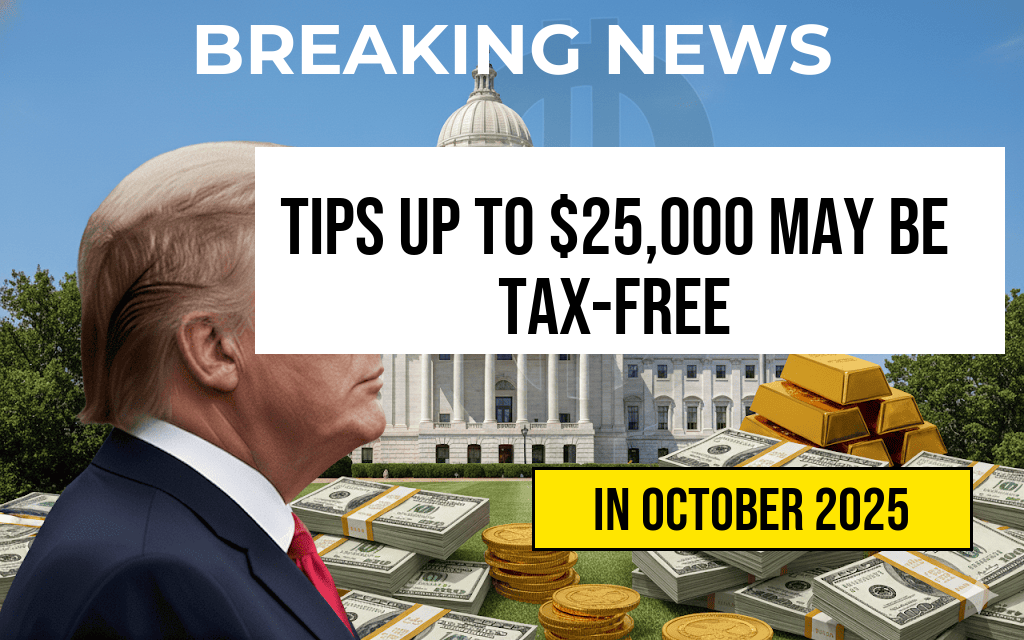Understanding the New Tax Rules for Tips and Payroll Taxes
Recent changes in tax legislation have introduced a significant boost for many American workers, especially those in the hospitality and service industries. Under the new guidelines, tips received by employees — which can sometimes amount to thousands of dollars annually — may now be *partially* tax-free, with some workers potentially pocketing up to $25,000 in untaxed tips each year. However, this benefit comes with important caveats: while tips may be exempt from income tax up to certain thresholds, payroll taxes such as Social Security and Medicare still apply. This nuanced policy aims to provide financial relief for low- and middle-income earners, but understanding the specific eligibility criteria and limits is essential for workers and employers alike.
Breakdown of the Tip Tax Exemption
The legislation, passed as part of broader tax reforms, allows eligible workers to claim a *tax-free* amount of tips annually. The key provisions include:
- Tax-Free Tip Cap: Employees can receive up to $25,000 in tips annually without owing federal income tax on that amount.
- Eligibility: This exemption primarily applies to tipped employees in certain industries, including restaurants, bars, and hotels, where tips constitute a significant portion of income.
- Reporting Requirements: Workers must report all tips received to their employers, who then include this information on W-2 forms for tax purposes.
It’s worth noting that tips exceeding the $25,000 threshold are subject to standard income tax rates. For example, a worker earning $30,000 in tips would only benefit from the tax-free limit on the first $25,000, with the remaining $5,000 taxed accordingly.
Payroll Taxes and Their Ongoing Obligation
While the income tax exemption is a welcome adjustment, payroll taxes — specifically Social Security and Medicare taxes — continue to apply to all tips, regardless of whether they are taxable as income. This means that:
- Employers are required: To withhold 6.2% for Social Security and 1.45% for Medicare from all tips received by employees.
- Employees are responsible: For paying their share of payroll taxes on all tips, including amounts that are tax-free for income tax purposes.
- Self-Employment and Independent Contractors: Different rules may apply, with some workers responsible for the full payroll tax contributions themselves.
This duality underscores the importance of accurate tip reporting and understanding one’s tax obligations. Workers should keep detailed records of their tips and consult with tax professionals to ensure compliance.
Implications for Workers and Employers
| Aspect | Before Changes | After Changes |
|---|---|---|
| Tax-Free Tip Limit | None; all tips taxable | Up to $25,000 annually |
| Payroll Taxes | Applied on total tips | Applied on total tips; tax-free tips still subject to payroll taxes |
| Reporting Requirements | Mandatory reporting of tips | Mandatory reporting; new thresholds may simplify some filings |
For employers, these changes necessitate updates to payroll systems and employee communication strategies. Accurate reporting ensures compliance and helps workers maximize their benefits.
Additional Resources and Considerations
Workers should remain aware of the IRS guidelines regarding tip reporting and tax obligations. The official IRS website offers detailed instructions on reporting tips and understanding tax liabilities. Additionally, consulting with a tax professional can clarify individual circumstances, especially for part-time or self-employed workers.
While the new policy offers potential savings, it emphasizes the importance of diligent record-keeping. Tips received in cash, via electronic transfers, or through credit card tips all need to be documented accurately to ensure proper reporting and to avoid penalties.
As legislation continues to evolve, workers and employers should stay informed through reputable sources such as Wikipedia’s overview of U.S. taxation or financial news outlets like Forbes.
Frequently Asked Questions
What is the potential tax benefit related to tips mentioned in the article?
Workers may receive up to $25,000 in tips that could be considered tax-free, providing a significant financial advantage for eligible employees.
Are all tips completely tax-free according to the article?
No, while up to $25,000 in tips may be tax-free, payroll taxes still apply to the tips and wages earned.
Who qualifies for the potential tip tax exemption mentioned in the article?
Eligible employees in the service industry, such as restaurant staff, who report their tips accurately may benefit from this tax advantage.
Does the article specify any requirements for claiming the tip exemption?
Yes, employees must properly report their tips and comply with tax regulations to potentially qualify for the tax-free tip benefit.
What are the implications for payroll taxes despite the tip exemption?
Even if tips are tax-free, payroll taxes such as Social Security and Medicare still apply to the wages and tips earned.

Leave a Reply